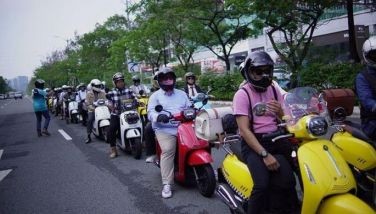Should causing traffic be a criminal charge?
After spending the 12 days of Christmas staring at the back of a bus, jeep, or any one of the other million and one stationary vehicles on the road last December, I really think that we should be taking traffic a lot more seriously.
When I say seriously, I mean we should actually treat those that deliberately cause it as criminals. Yes, seriously. Because if you think about it, once you add up the cost of wasted fuel, the loss of man hours and productivity (not to mention the cost to the environment) and multiply that by the millions of vehicles that idle senselessly every single day because of someone’s selfish, stupid or inconsiderate act, it no longer becomes just a public nuisance, but a form of theft. And it’s about time we held people properly accountable for that.
I’m not suggesting that everyone who commits a traffic infringement be treated as such, but anyone deliberately or systematically causing traffic should face much stiffer penalties, with possible jail time or community service for serious or repeat offenders. The buses, jeeps, tricycles, taxis and any of our other undisciplined drivers are a given, of course, but just before you think this is just another public utility driver rant, I’d like to focus instead on the institutions and establishments that one could argue are another root cause of most of these losses.
Take many large schools as an example. Many of them are making a fortune in tuition fees from teaching our children, but promote anarchy outside their gates simply by refusing to invest in enough parking, driveways or vehicle access for the amount of students they charge for. They design their buildings to accommodate as many classrooms as possible, but leave no room on their land for anything they cannot earn from—as if anything past their sidewalk is everyone else’s problem. They can say what they like about rush hour, etc., but unless they were expecting that each student just fell from the sky each morning, it’s not as if they couldn’t foresee that. Hello? To think they are teaching math behind those gates.
What ends up happening is that you get cars, school buses, jeeps, and tricycles parked four deep and choking main roads for everyone—all so these schools can make their money. Same goes with malls, large hotels and other commercial establishments. And to make matters worse, they have amplified it by insisting on redundant security checks when entering their lobbies of car parks.
Don’t get me wrong, I’m all for security and safety, and if I could see that these measures were providing anything except traffic jams, people jams, and a general reduction in IQ and productivity, then I would be the first to not just cooperate but advocate. But they’re not. They check your trunk, but not the bags in it; so unless you’re pulling in to the car park with a black bowling ball with a fuse that says ACME TNT on it, not just is it not an effective way to curb violence, terrorism and other security issues, it is just downright patronizing.
And because these places are usually situated in the most densely populated areas, these condescending inspections that have all the prevention powers of a life-size cardboard cut-out of a policeman on every street corner, end up backing up traffic for everyone—not just their patrons. The other day it took me over 30 minutes to circle around the garden in front of Glorietta 4 simply because the line to the entry of the car park had snaked around so far back that it was actually preventing cars from exiting the same car park. If you can picture trying to draw a figure 8 but with no one giving way at the intersection, you’ll get a good feel of how it works.
While attending a Christmas party in a five-star hotel chain in Newport City, the line to get in was so long I managed to park two steel car parks away, on the second floor, walk over, have a beer, all before my colleague, who was in line ahead of me was able to enter the driveway. The guards circled each car, inspected the trunk, and asked a series of pointless questions before raising the US-embassy-level, hydraulic (or electric) steel barriers with spikes coming from the ground that welcome each guest.
There was another time I went into a mall where I was frisked quite enthusiastically. Out of curiosity, I asked what they were looking for. The guard snaps back, “Deadly objects!†That is fair enough, I thought. But once inside, you could readily buy guns, knives, swords and a whole range of other military-grade assault weapons.
But while most of us laugh it off as just part of living in the Philippines, what is not so funny is the thought of an entire country unnecessary idling in traffic for five, ten, fifteen or twenty minutes while we wait for schools to inefficiently pile in their students, establishments to bottleneck roads to rake in customers or for car parks to perform these checks just to humor themselves.
They will always pass it off as security, volume, high demand, whatever. But in the end, we can all come up with excuses; bottom line is, if you are causing a problem, you need to take responsibility. So they can say what they like, but just as I can sure as hell tell you that if you or I had a party in our houses and our friends blocked the neighbor’s driveways or took up their street parking that the association or the authorities would be on our rear ends faster than Gangnam went out of style; it begs the question: why are they exempt?
- Latest



























